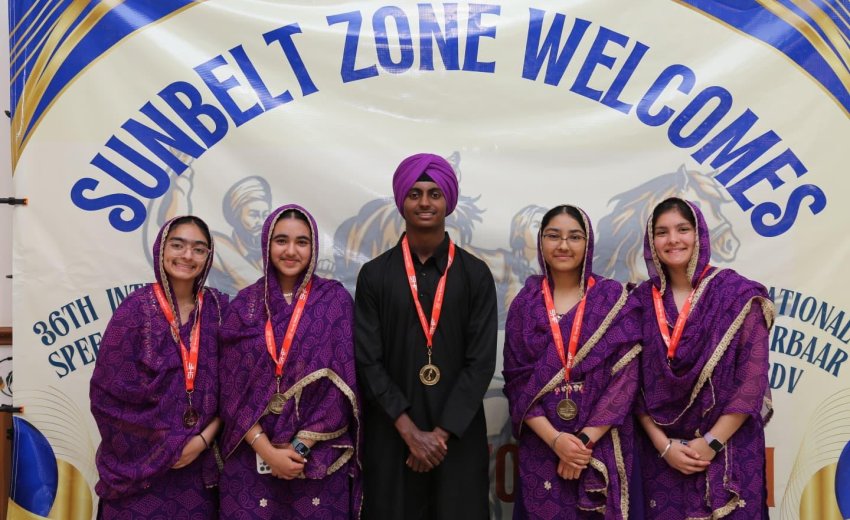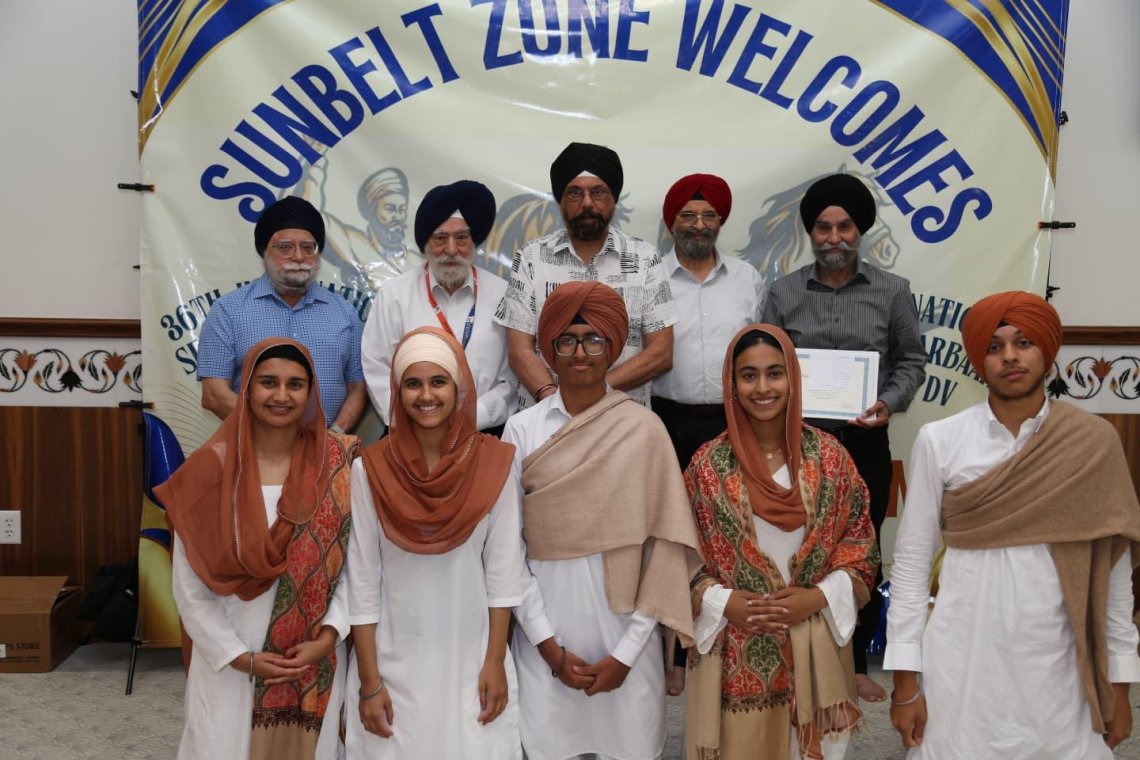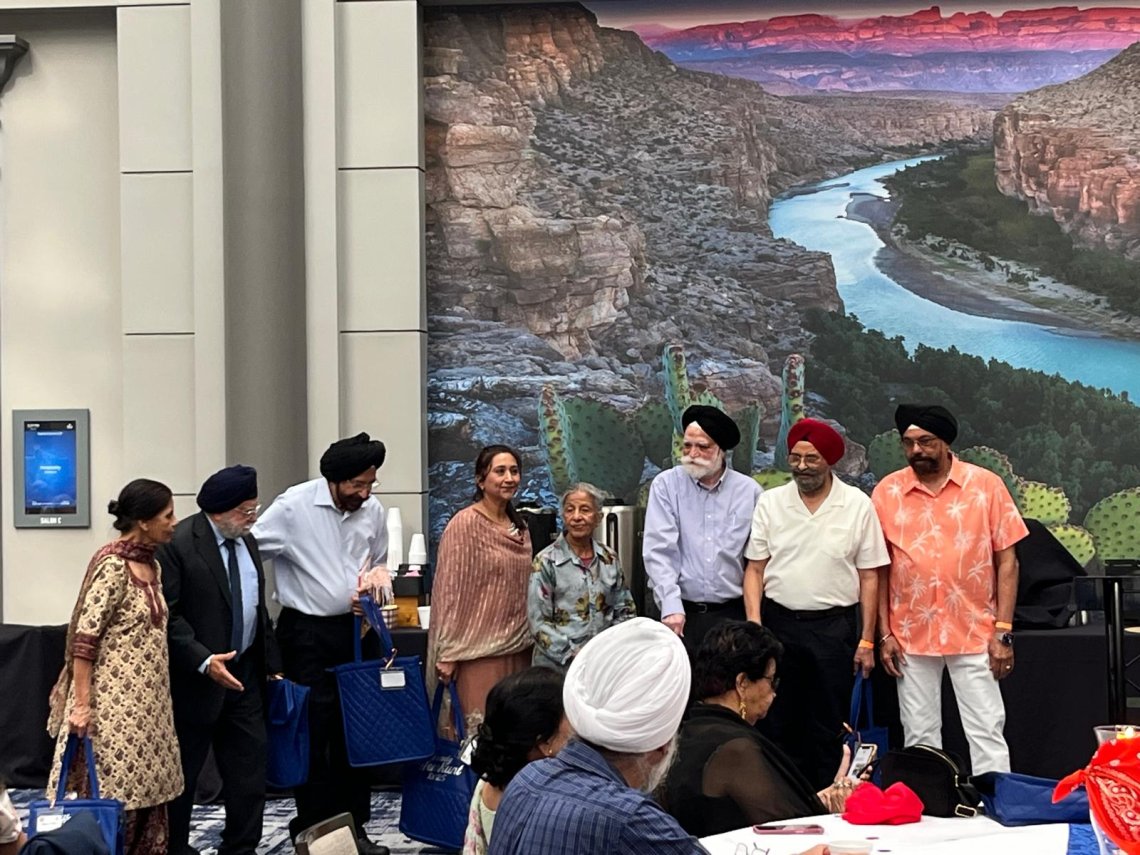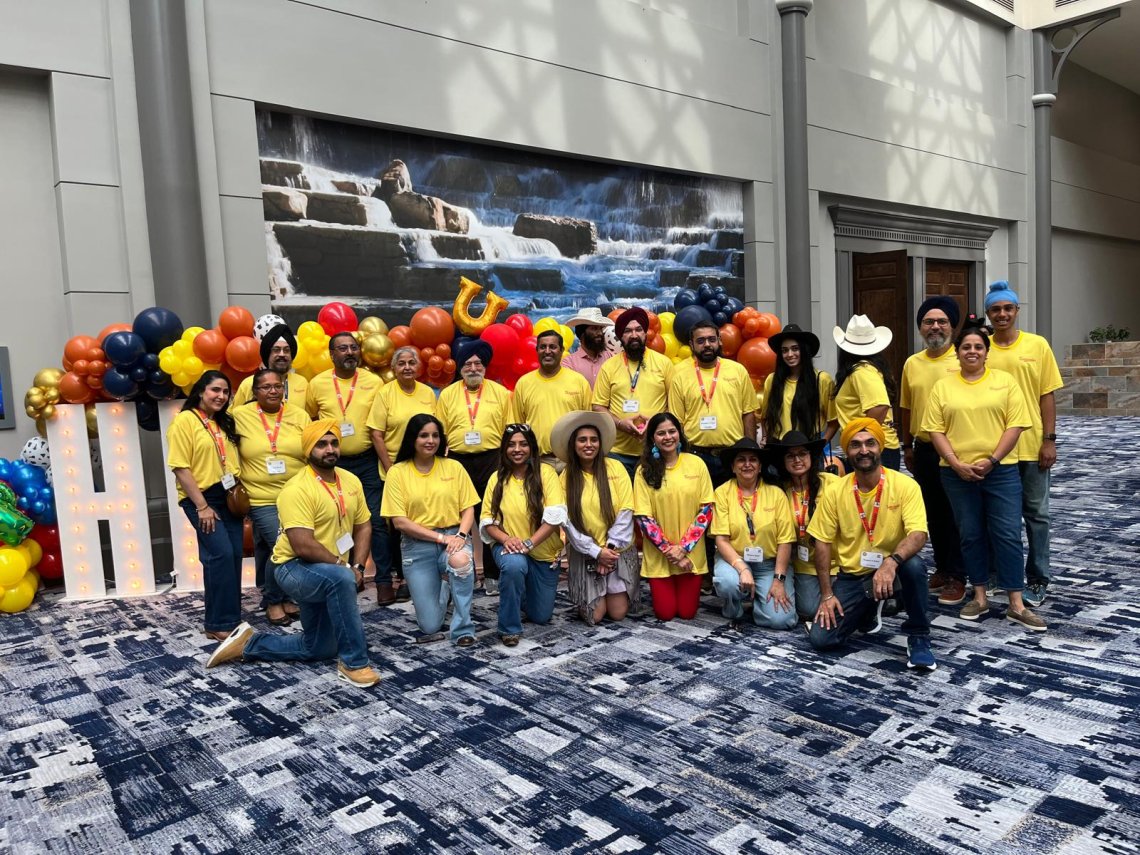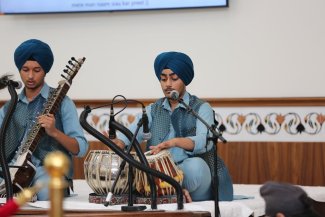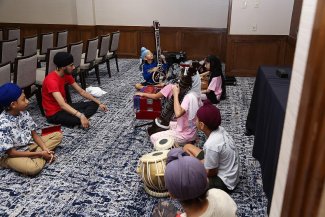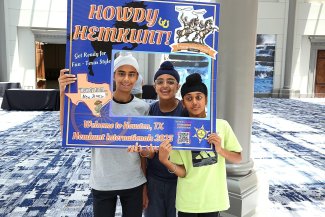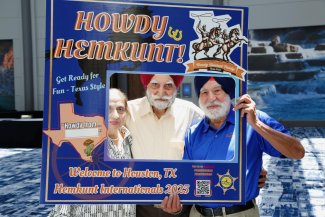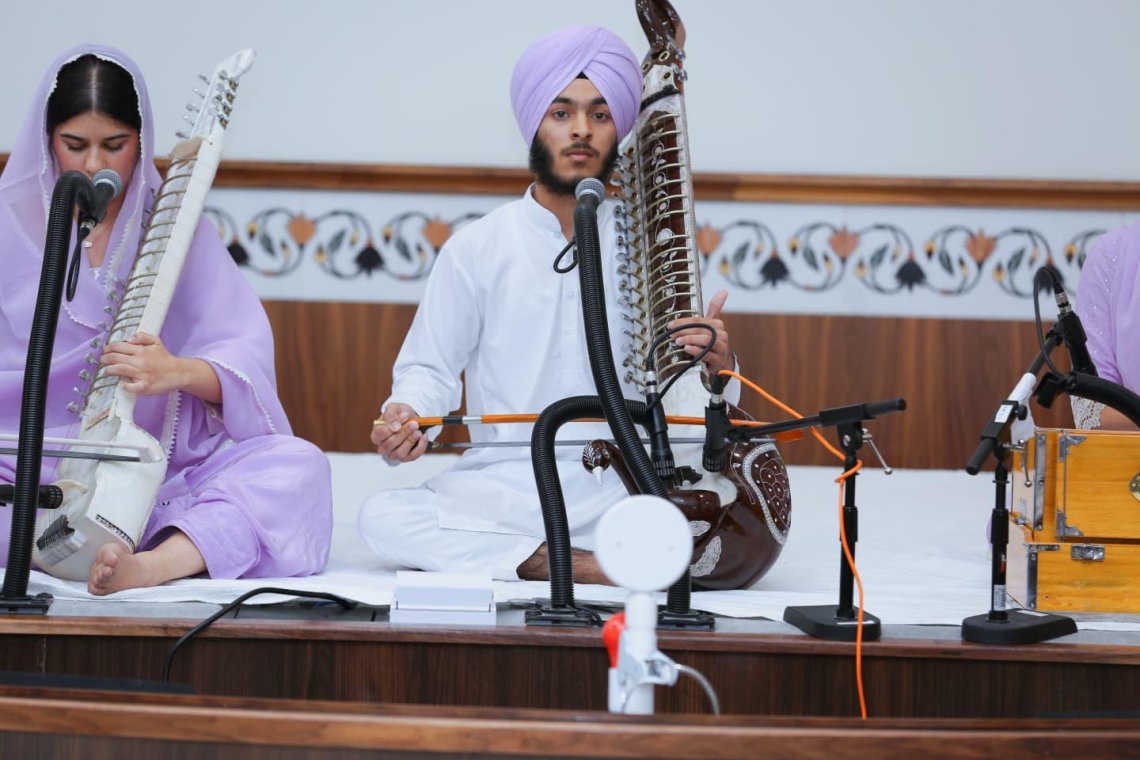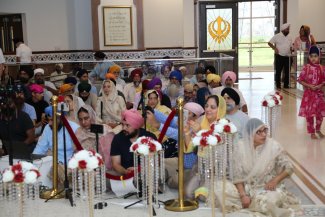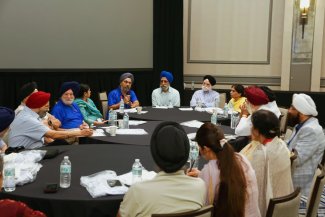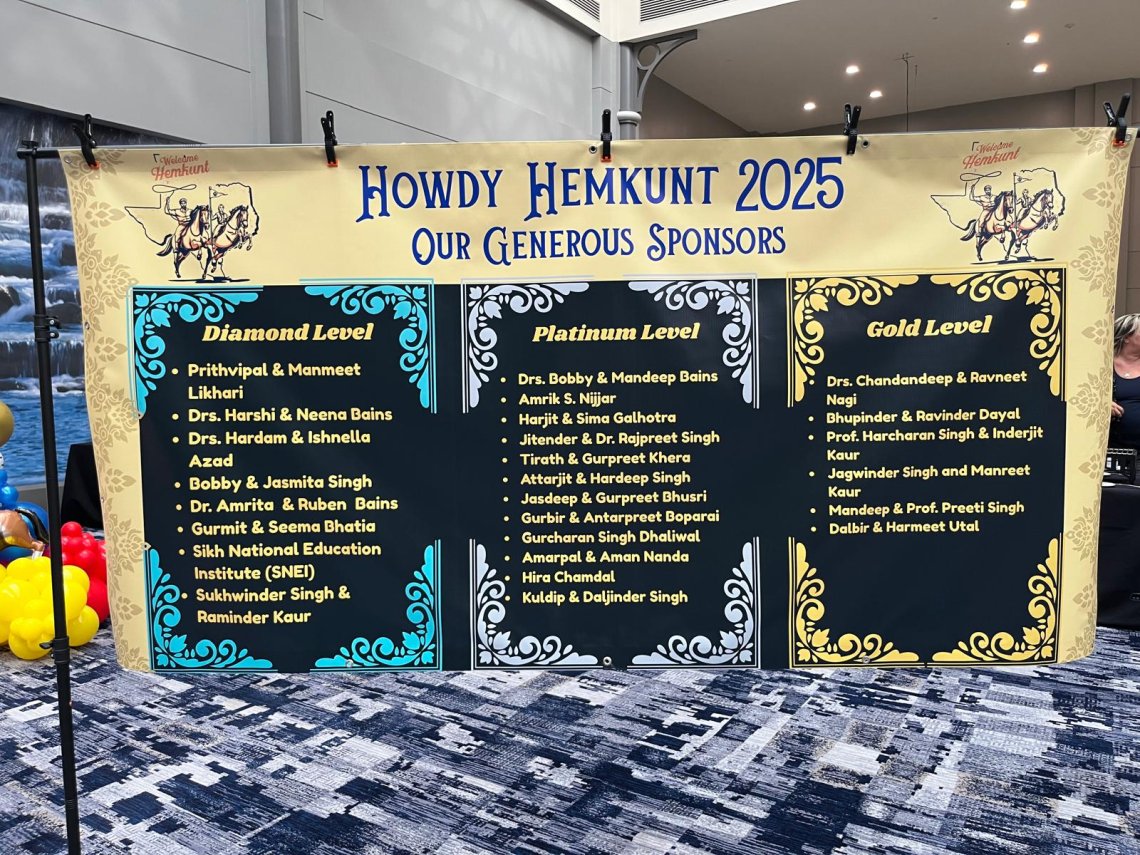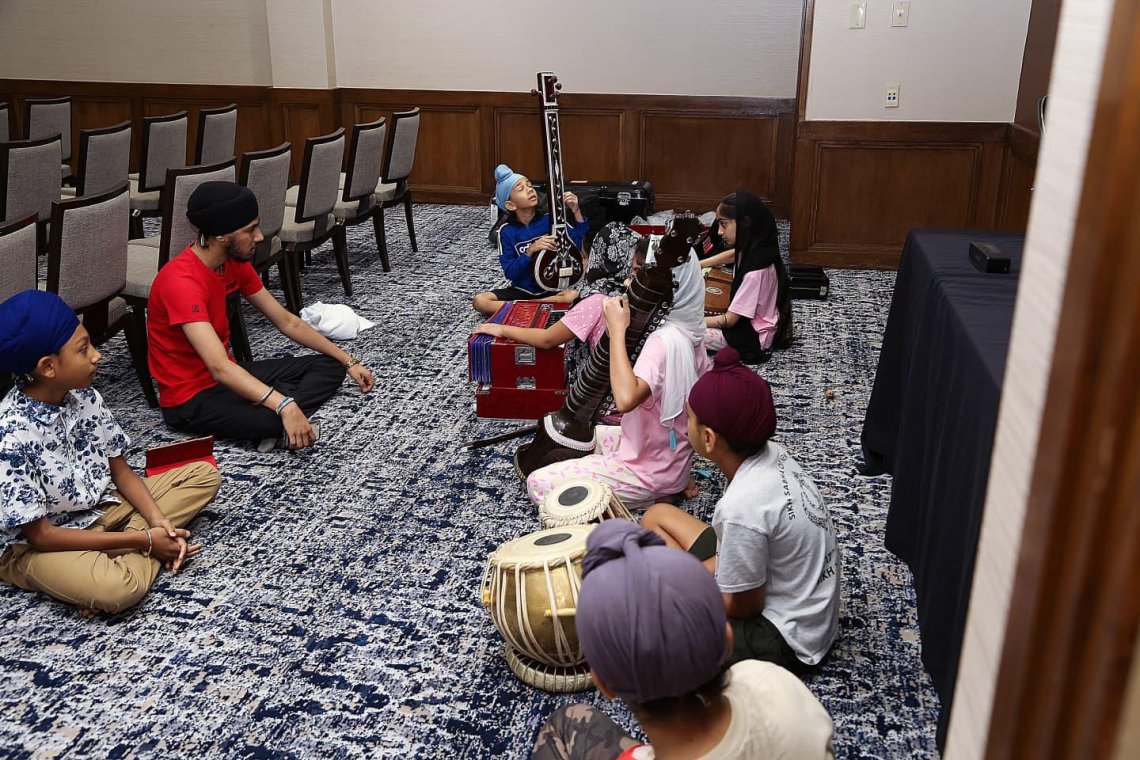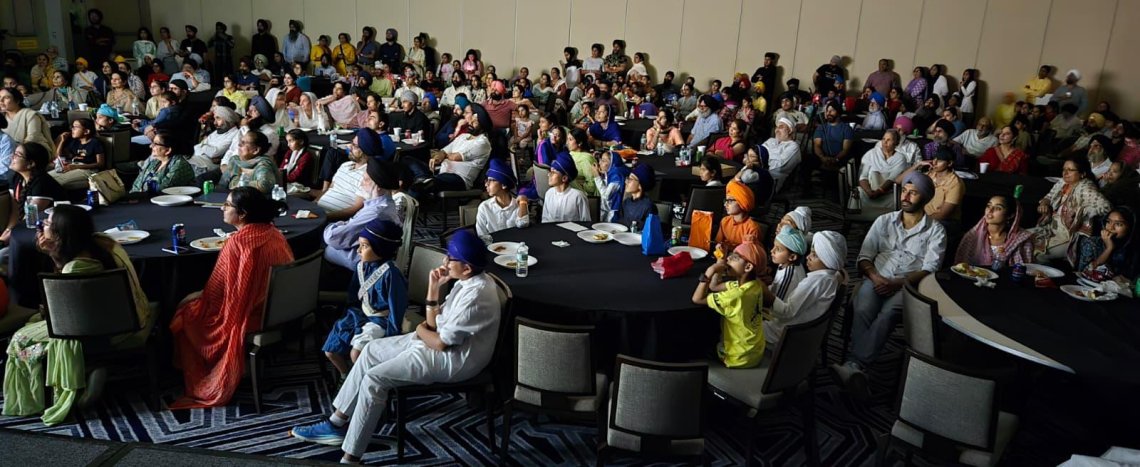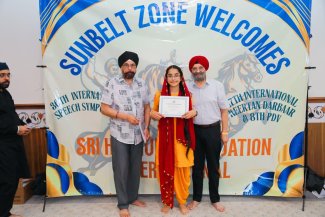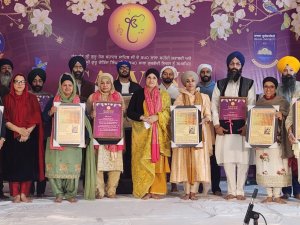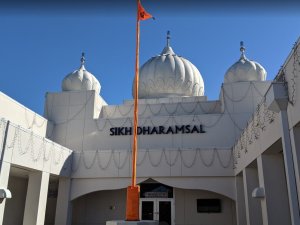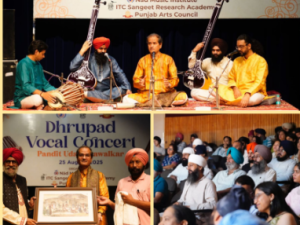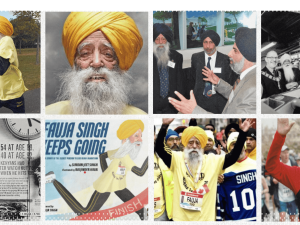The 2025 Sri Hemkunt Foundation Symposium and Keertan Darbaar competitions took place in the Sun Belt Zone in late July, hosted by the Sunbelt Zone Gurudwaras of Texas, in conjunction with accommodations, with events held in various conference halls provided at the Hilton Hotel, Houston North.
The Events of 2025 took place over 4 days:
- Wednesday, July 23, 2025: Hilton, 5 pm - 11 pm Kirtan Practice. Hilton, 9:30 pm to 11 pm Youth Activity & Jam Session.
- Thursday, July 24, 2025: Hilton, 9 am - 11 am Kirtan Practice. Kirtan Group 1 at Gurudwara. Hilton, 9:30 pm to 11 pm Youth Activity & Jam Session.
- Friday, July 25, 2025: Hilton, 7 am - 11 am Kirtan Practice. Kirtan Groups 2 & 3 at Gurudwara
- Saturday, July 26, 2025: Hilton, 9 am – 12:45 pm Speeches Groups 1,2,3,4 & 5. 12:45 pm – 3 pm PDV Presentation. Special Performance by Houston Youth. 5:30 pm – 10 pm Rodeo Night. 10:15 Youth Activity & Jam Session.
- Sunday, July 27, 2025: Gurdwara, 8 am – 11:00 Kirtan Group 4. 11 am - 12:30 pm Closing Ceremony
The events offered participants the opportunity to connect with guests from around the USA, London U.K., and Kenya.
Sun Belt Zone Gurdwaras
The collaboration of Texas gurdwaras in the Sun Belt Zone includes:
- Sikh National Center (SNC) & Sikh National Education Institute (SNEI) – Chairman Dr. Hardam Azad
- Gurdwara Sahib of Southwest Houston – Pritvipal and Manmeet Likhari
- Sikh Center of the Gulf Coast Area – President Amrit Singh Nijjar
- Gurudwara Sahib of Houston Breen
- Austin Gurdwara Sahib
- Gurudwara Singh Sabha Dallas
- Sikh Dharamsal San Antonio
2025 Sewadaars include:
- Southern Region Sewadaar Host Committee Ruben Singh Bains
- Panthic Digital Voice (PVD) Dr. Preeti Singh, in collaboration with Sikhlens
Sri Hemkunt Foundation
Visionary S. Shamsher Singh established Sri Hemkunt Foundation Inc. of New York, USA, in 1980 with a singular purpose to convey the Sikh Guru’s message to children and youth. In 1984, the operations expanded beyond New York. Over the past 41 years, participation has grown from 19 to 2,000 and today extends to Canada, Kenya, and the United Kingdom.
There are 69 Gurdwaras in the Western Hemisphere that participate in the Hemkunt Foundation programs. These are divided into Central, Zonal, and International. These are divided into 25 zones. Each zone has three or more centers, and each zone has 25 to 35 children participating. They are divided by age groups: 7-9, 10-13, 14-15, 16-17, and 18-25.
Sri Hemkunt Foundation aims to create an environment in the West that:
- Promotes the teachings of the Sikh Gurus.
- Encourages participation by children, youth, and adults in religious activities, learning Keertan, Gurbani, Sikh Religion philosophy, Sikh history, Sikh arts and culture, Punjabi language, and Gurmukhi script.
- Establishes schools, libraries, and art galleries, and partners with established institutions that respect Sikh values.
- Organizes camps, conferences, and seminars around the world.
The Sri Hemkunt Foundation, 2025 staff members include:
- President Prithpal Singh NY
- Vice President Karamjit Singh NY
- Treasurer Anoop Singh NY
- General Secretary Ravinder Kaur NY
Keynote Addresses, Panel Discussions, Workshops, and Networking Sessions
Much more than a competition, the Hemkunt Symposium promotes learning, with an emphasis on self-expression, offering the opportunity to develop skills in public speaking, keertan, and leadership guided by the values of Sikh heritage.
- Speech Symposium (Kathaa)
- Kirtan Darbaar
- Panthic Digital Voice (PDV)
Why We Hold Competitions – Conversations with Judges
Sikhnet: The first time I heard of a kirtan competition, the idea of competing in something that I held so sacred really put me off. Someone kindly explained that holding competitions dates back to the early days of Sikhi during the era of the Ten Gurus, who encouraged competitive wrestling, skill in horsemanship, and with weaponry.
In those days, keertan would have been performed by bards and minstrels trained from childhood in families with those lineages. In modern times, competitions also include keertan, kathaa (preaching, public speaking, and debates).
I did not understand the importance of these kinds of modern-day competitions, however, until I spoke with Judges who participated in the recent Sun Belt Hemkunt International Symposium 2025, asking:
“What motivated you to become involved with Sri Hemkunt? Why are competitions so important? How are the Symposium competitions held?” “What is the criterion for picking a winner in the various categories?”
Symposium Speech Judges, Dr. Gurinderpal Singh, the Sri Hemkunt Regional Western North Director, and his wife, Pushpinder Kaur, an author who developed curricula for teaching students both English and Punjabi as a Second Language, responded, sharing a bit of their history:
“My wife, Pushpinder Kaur, and I spent a year in New York from 1991 to 1992, living in Yorktown Heights and attending the Gurdwara Sahib in Fishkill. It was there that we first encountered the Sri Hemkunt Foundation’s speech symposium. We were deeply impressed by the concept—children were not only learning about Sikhi but also developing the ability to express and articulate their understanding of it.
Earlier, in 1984, we had moved from Germany to San Jose, California. At the time, we faced challenges in finding Keshdhari Sikh friends for our three-year-old son. Many newly immigrated parents were cutting their sons’ hair to help them assimilate more easily into the school environment. I believed that if children could confidently articulate their Sikh identity and values among their peers, they would be more likely to be accepted—and would also become better communicators and learners.
After returning from New York, we established a Hemkunt Foundation center at the San Jose Gurdwara Sahib, where we had previously founded a Khalsa School in 1989. At that time, our center was part of the Northern California Zone, led by S. Madanjit Singh Ji of El Sobrante Gurdwara Sahib. With his encouragement and the dedicated efforts of volunteers and parents, our center flourished and helped reinforce Sikh identity among children.
Participation in the South Bay area grew significantly. With support from S. Madanjit Singh Ji, our Gurdwara Sahib, along with the Chardikalaa Community Center and Stockton Gurdwara Sahib, formed the Silicon Valley Zone. I had the honor of serving as the Zonal Convenor. The enthusiasm for the speech symposium was so strong that, at one point, students from San Jose earned more top-three positions in the international symposiums than all other Gurdwaras in the U.S. combined.
In 2006, we hosted the International Symposium in San Jose. During this event, S. Shamsher Singh Ji proposed the idea of a Keertan Darbar to encourage children to sing shabads in the original Raags as specified in the Sri Guru Granth Sahib. He also advocated for the use of traditional Tanti Saaz instruments, as used by our Guru Sahiban. The Keertan Darbar became an official part of the International Symposium in 2007.
To better organize the Keertan Darbar, Hemkunt zones were divided into five regions: Western North, Western South, Southern, Eastern, and European. In 2007, I became the Regional Keertan Coordinator for the Western North Region and have continued in that role ever since. Currently, S. Narinderpal Singh serves as the Co-coordinator. That same year, S. Gurumukh Singh Tiwana assumed the role of Zonal Convenor for the Silicon Valley Zone. The Zone has since grown significantly and has now been divided into three Zones, led by S. Gurumukh Singh, Dr. Gurminder Singh, and S. Akbal Singh Karlcut.
Last year, we hosted the International Symposium and Keertan Darbar in San Jose. The event was a tremendous success, with over 600 participants from across the U.S. and England. A detailed report is available at: https://sanjosegurdwara.org/Hemkunt_2024_newsLetter.pdf
This year, the event was hosted by the Sunbelt Zone in Houston and featured a distinct Texan flavor. It was exceptionally well organized by a dedicated team led by S. Ruben Singh, S. Harcharan Singh and Zonal Convenor S. Dawinder Singh. A souvenir for this program is available at 2025-Hemkunt-Magazine.pdf
Next year, we look forward to participating in the International Symposium and Keertan Darbar in Nairobi, Kenya.
Both the Speech Symposium and Keertan Darbar have grown tremendously. It is truly inspiring to witness children delivering powerful speeches and performing beautifully in Keertan. Their vocal talent and mastery of traditional string instruments—such as the Rabab, Saranda, Taus, Tanpura, and Dilruba—and percussion instruments like the Tabla, Jori, Pakhawaj, and Mridang continue to improve year after year.
What keeps us motivated is seeing these children grow in their understanding and practice of Sikhi. The enthusiasm of parents, trainers, fellow regional coordinators, zonal convenors, and the board members of the Sri Hemkunt Foundation is contagious. It is a privilege to be part of such a meaningful and inspiring initiative.”
Sikhnet: I learned that competitors in both keertan and speeches have been meticulously trained by Sikh men and women who have dedicated their entire lives to the propagation of the deeper aspects of Sikhi in the West.
Many of the judges began as students who mastered their fields of expertise. They, in turn, teach and train students of all ages, who willingly dedicate themselves to their particular pursuit.
Both Keertan and Kathaa require dedicated study and devotion to practice. Competitions have been very successful in teaching Sikh history and Gurmat to both the youth and their families, who coach them.
In this way, Sikhi prospers and thrives, all the while supported by the generosity of donors, the sewa of organizers, coordinators, conveners, committees, parents, and the participation of competitors and judges. Such competitions are truly collaborative events.
2025 Keertan Darbaar Judges
Keertan judges are souls with superior knowledge and skills garnered from decades of dedicated purpose, endowed with education of the increasingly rare historical knowledge of classical raag, and having skill with traditional string and percussion instruments:
- Dr Gurleen Kaur Ph.D, is an Amritdhari Gurmat Sangeet keertan traditionalist who studied with Dr. Gurnam Singh.
- Manmeet Singh, is a devoted practitioner of the Gurmat Sangeet tradition.
- Dr Manpreet Kaur of UC Davis, classically trained in Gurmat Sangeet tradition with Bhai Avtar Singh and Bibi Amrit Kaur and others, teaches and composes in 62 variations of the 31 Raags of Guru Granth Sahib, has served as a judge with Hemkunt Foundation for over a decade.
- Sirdarni Bibi Jasbir Kaur Rababan MBE, a master of performing raga kirtan with traditional string instruments such as the Sikh Rabab, Taus, and Dilruba, is the former CEO of Raj Academy, and is pursuing her Ph.D. at UC Riverside, where she researches neuroscience and trauma healing through kirtan as medicine.
- Sardar Jaswinder Singh Rathour, is a distinguished practitioner of Gurmat Sangeet with an M.A. with Distinction from Punjabi University of Patalia, for Preservation of Raag Tradition by promoting, propagating, and celebrating the purity of Gurmat Sangeet.
- Bhai Bhupinder Singh Paras of Houston sangat is proficient in raag and taal, committed to classical raag kirtan, and the promotion of Gurmat Sangeet. He has judged numerous Keertan Darbaar competitions and is active in Akhand Kirtan programs.
- Bhai Hardeep Singh, an experienced judge, a distinguished Gurmat Sangeet scholar from an early age, who studied with Dr. Gurnam Singh, and who is skilled in playing classical string instruments.
2025 Speech Symposium Judges
Many Judges are, or have formerly been, credentialed Educators, and all have experience in various forms of sewa in the Sikh community:
- Dr Gurinder Pal Singh Vice President of San Jose Gurudwara in California and director of its Khalsa School. He is also the Keertan Darbar Coordinator for the Western Regional coordinator of the United States and has been associated with the Sri Hemkunt Foundation Sikh Youth Symposium since 1992.
- Pushpinder Kaur is the author of 20 books, including “The Boy with Long Hair”, and a credentialed educator with an M.A. in teaching English as a Second Language. She is a founding member and administrator of the Khalsa School in the San Jose Gurudwara of California. She also designed a curriculum for teaching Punjabi as a Second Language, along with Gurmukhi Script, which has been used to teach at numerous schools, including universities in the USA and Canadian Public schools. She became involved with Sri Hemkunt Foundation Symposium when her children were participants, and is also a member of the Kaur Foundation board of directors.
- Hardeep Kaur of New York has an M.A. in Library Science and played a prominent role in establishing a library at Plainview Gurdwara, where she formerly served as secretary.
- Mini Kaur / Geetinder Gujral of New York is a Punjabi language teacher at her local gurdwara gurmat school. She became involved with the Hemkunt Speech Symposium when her three children participated in the program.
- Inderpal Kaur first became involved with Hemkunt Symposium as a judge for Zonal Speech in 2008 when she and her niece, a participant, traveled to London, UK. She has also judged competitions in New York and San Jose, California.
- Kamlesh Kaur has been with the New York City Department of Education for over two decades and has been involved with the Sikh community and the Hemkunt Foundation since 2012, serving as a judge at local, zonal, and international levels.
- Taranjit K Singh has lived in Houston since 1985, where she taught elementary school at the third and fourth grade levels. She has been judging competitions with Sri Hemkunt Sahib Foundation Symposium for six years at the Center and Zonal levels.
- Mukhtar Singh Kambhoj of New York has been the director of the Long Island gurdwara Punjabi Schools since about 2009, and a central coordinator for the Hemkunt Foundation since about 2014.
- Khalsa Lakvir Singh of Kenya is fluent in Punjabi, Hindi, Swahili, and English and has been affiliated with the Hemkunt Foundation Symposiums since 2019, and is spearheading the 2026 Symposium to be hosted in Nairobi for the first time since 1994.
- Dr Jaswant Singh is the author of several books, a board member of the Arizona Interfaith Movement, founder of the weekly webinar, Global Gurmat Vichaar Initiative, and the coordinator for the Grand Canyon Zone and a regular judge for the International Hemkunt Foundation speech competition.
- Madanjit Singh has served as the director of Guru Angad Dev Khalsa School, Secretary of the Sikh Center in El Sobrante, California, Treasurer of the Sikh Center in Queens, New York, and has been involved with Hemkunt Foundation since 1994, where he served as Trustee. He introduced youth programs in Arizona, California, and Texas, and is their Convener. He also helped with the first keertan program and the International Youth Symposium held in Florida.
- Bhupinder Singh is the author of several books and publications and has been actively involved since about 2009 in judging for the Sri Hemkunt Foundation Symposium at Center and Zonal levels.
- Harkishan Singh established and computerized Sikh Library at Gurdwara Blen Rock New Jersey, has been associated with Sri Hemkunt Foundation since the 1990s, and has served as a Center and Zonal convener, and Judge since about 2019.
- Harcharan Singh has been associated with the Hemkunt organization since its inception, and created a Local Center in North Carolina and is a Zonal convener for the Sun Belt Zone in Texas.
- Harinder Singh is a telecommunications specialist new to the Hemkunt Foundation and excited to further the propagation of Sikhs and Sikhi around the world.
2025 Panthic Digital Voice (PDV) Judges
- Davinder Singh is an Indo-Canadian Actor, director, and producer whose recent productions include “Khalsa Centre – Simran, Seva, Sangat”.
- Gurdip Singh Dhaliwal is a Punjab-based filmmaker who has collaborated with Sikhlens and will be attending Chapman University as a Sikhlens Scholar in pursuit of a degree in Cinematography.
- Only Kewal has acted for over a decade with multiple theater groups, including three Punjabi Stage plays in 2023.
Donors and Sponsors
Donors are perhaps the most important element of this kind of event because it could not take place without their generosity. Sponsors enable participants to receive the training required to qualify and compete.
Donors are tiered: Diamond, Platinum, Gold, Silver, Bronze, & Sangat Supporters. Gifts of any amount, whether $100 or $10,000, add up to making it possible to bring sangat together. When investing in propagating Sikh heritage and values, each contribution is priceless.
Regional Coordinators, Conveners, Organizers, and Sewadaars
No event could go forward without these souls giving generously of their time and energy to make everything run smoothly.
Parents and Families
Parents and families are indispensable for the motivation and support of children competing at the International Level.
Competitions and Contestants
More than 2000 children and youth are associated with the Sri Hemkunt Foundation. They first compete in their Local Center in their age group and then in their Zonal Region before advancing to the International Level. Contestants range between the ages of seven and 25, and contend in either the Keertan Darbaar or the Kathaa Symposium Speech competitions.
Judges' Eligibility Criteria
Judging is the most challenging aspect of organizing the competitions. Judges must be qualified experts in their field who are required to fill out an affidavit stating:
- Their competence, knowledge, and skill.
- They are unrelated to any competitors.
- They have in no way assisted, coached, or trained any of the current participants.”
Keertan Darbar
Music should be used to enhance shabad-surat (understanding) rather than to exhibit musical artistry. The focus of Keertan should be on the bhaav (emotion) of the shabad. The words of the shabad are to be very clearly enunciated and comprehensible. The words should not be unduly stretched, or sung too quickly, or dominate the music. String instruments must be played, not simply held.
Timekeeping, Scoring, and Ranking
- Timekeepers record the time of each Jattha, and shall be unrelated to the Jattha in any way.
- Judges note score and provide an independent evaluation of Jatthas and do not discuss
performances among themselves.
- The sum of rankings by all judges determines placement.
The 2025 Keertan Darbaar competitions took place at the Gurdwara. International Contestants compete in groups of three to five and hail from several regions. They are judged with a point system on timing, taal, raag, pronunciation of Gurbani, and voice control.
Four regions sent a total of 137 competitors to the 2025 Hemkunt Keertan Darbar:
- Southern Region sent 8 groups, totaling 39 participants
- Eastern Region sent 9 groups, totaling 45 participants
- Western South Region sent 7 groups, totaling 29 participants
- Western North Region sent 5 groups, totaling 24 participants
Symposium
The 2025 Hemkunt Symposium took place at the Houston Hilton North Hotel. In all, 85 competitors participated, with 34 of these contesting in the Punjabi language.
- Contestants are divided into 5 groups by age and quizzed on the subject matter of a book they are given to read. Every year, a different book is prescribed for each age group.
- Each contender is asked 5 questions about the content, and replies are given either in Punjabi or English during a span of 5 to 7 minutes.
Who Are the Winners?
Competitors are awarded gold, silver, and bronze, or participant prizes.
The winners, however, are not simply the competing groups with the best score. Preparing for competition teaches contestants the skills, art, and science of their particular interest, which will remain with them for all their days, and which they can, in turn, pass on to future generations.
The real winners are the entirety of the Sikh Sangat, who are rewarded by the effort it takes to create, coordinate, and invest in the future of the Sikh community, while also benefiting the broader community of which the Sikh Sangat is just a small part.
What’s Next?
The symposium is hosted by rotation in different zones every year. Generally, at least 15 years pass before an area hosts again.
The Sri Hemkunt International Symposium is scheduled to be held in Kenya in 2026. It has been 34 long years since Kenya hosted the Sri Hemkunt Foundation, and the sangat is surely looking forward to this forthcoming exciting event.
